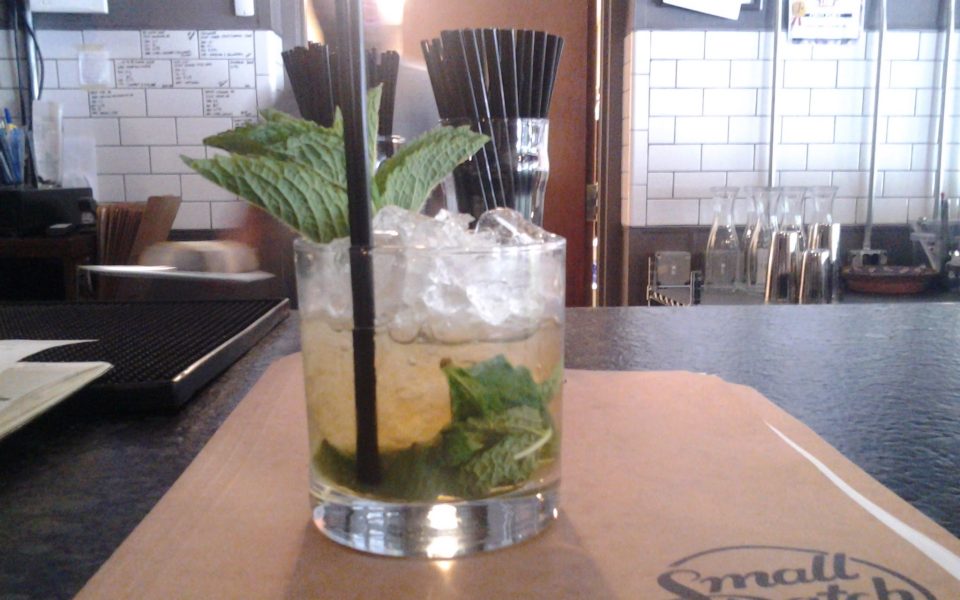The Kentucky Derby wouldn’t start until 6:24 p.m., but Small Batch Beer Co. in Winston-Salem threw a daylong viewing party to celebrate.
There was only one couple in the bar when I arrived in my seersucker suit, but both were dressed to the nines — at least the high sevens. The man was in khakis and Oxford shirt with a pink-paisley bowtie; the lady in a black-and-white sundress. She drank a canned grapefruit Radler and sang along with the speakers pumping “Billie Jean.”
“I don’t follow [horseracing] much, but Todd Pletcher lives in my home town,” said Sundress.
Todd Pletcher, resident of Garden City, NY, was the trainer of three starters for the Kentucky Derby: Carpe Diem, Materiality and Itsaknockout.
“He goes to church with my family, but he spends some time in Kentucky with the horses and takes his family down to Florida, too,” Sundress told me.
Quentin Williams, the head bartender, said the party was busy all day last year.
“But with this weather,” Williams said, “it’ll get busier around the race; ’round 4, 5, 6.”
You’d have to be an idiot or a writer to stay inside while it’s 75 and sunny.
The party promised mint juleps, $2.50 gourmet tacos, a bowtie competition and the Derby broadcast on the TVs over the bar, but Small Batch wasn’t drawing people in during the early afternoon.
There’s a funny thing about the Derby. As much as people moan about baseball — how long the games last, how nothing happens for long stretches until the occasional flashes of brilliance — 170,513 people seem to have little problem with standing around Churchill Downs drinking for over six hours waiting for a bunch of very important horses to run a loop for two minutes. It’s a funny disconnect in logic, but in my experience, presenting people’s hypocrisies straight to their own faces rarely leads to insight or change in mind.
We live in the South, after all.
The Derby is tradition. Across the country, women don outrageous hats and men recall how to arrange a bowtie; it’s all for a fleeting moment in a drawn-out spectacle of which many have little knowledge.
At Small Batch, though, things were low-key. I only saw one simple hat the entire day.
As the early races ran, the most notable thing was the names of the horses: I’m Already Sexy, Clearly Confused, Pants on Fire, You Bought Her.
Though I loved the names, I realized that no matter what, you should never bet on a horse based on name alone; none of those horses even placed.
No matter which horses stood as favorites, I learned through my friend Audrey that jockeys are a more tremendous asset to races than I expected.
“The rider has to be able to match their riding style to the horse’s running style while following the trainer’s orders,” she said, “all while balancing on their toes moving at 40 miles an hour over the moving muscles of a 1,400-pound animal.”
A great jockey can drum up a decent horse and upset the field.
At the same time, a strong horse can blow everyone away.
American Pharoah cast shade on his competitors like no other animal I’ve ever witnessed. The strength and confidence in his gaze felt human.
Dortmund, sired by 2008 Derby winner Big Brown, was the sly second favorite. He’d be the first undefeated horse born to an undefeated Derby champion.
Either horse would be historic: If American Pharoah won, it’d mark the first time a favorite had won three Derbies consecutively in 40 years.
Perhaps it’s because I’d spent five hours practically alone at Small Batch, but my anticipation for the final race reached a boiling point as fans filled the bar.
After the bugle call came “My Old Kentucky Home.” Not a soul in the bar knew the lyrics, even the melody. Why should we? We’re Carolinians.
Then again, neither did 95 percent of the people the cameras caught during the recital; at least, they didn’t care to sing. Anyway, the Derby is a social event, not a chorale.
My blood ran quick in the moments before the gates opened, and when the bell rang and the gates swung wide and the horses charged out, the full bar whooped and hollered.
“C’mon, Dortmund!” many screamed as the blood of a champion led the cluster of 17 horses.
Dortmund led by a half-length, only losing it in the top of the stretch.
It became a three-way heat, but American Pharoah and Firing Line surged ahead of Dortmund; Frosted held up the rear. As American Pharoah crossed the finish line, a tide of release drifted over me. Firing Line, the 8-1 dark horse jockeyed by three-time Derby winner Gary Stevens, placed second; Dortmund took third and Frosted fourth.
It was all over in two minutes and three seconds.
I wondered how many people at Small Batch, in their heart of hearts, really cared.
“Do y’all follow horseracing?” I had asked that first couple I saw at the bar.
“No, I know absolutely nothing about it,” Bowtie replied.
Join the First Amendment Society, a membership that goes directly to funding TCB‘s newsroom.
We believe that reporting can save the world.
The TCB First Amendment Society recognizes the vital role of a free, unfettered press with a bundling of local experiences designed to build community, and unique engagements with our newsroom that will help you understand, and shape, local journalism’s critical role in uplifting the people in our cities.
All revenue goes directly into the newsroom as reporters’ salaries and freelance commissions.



We thought you might have been a writer! I hope you enjoyed my singing =)
-Sundress
I hope you enjoyed my writing!
Also, Fun Fact: Editor-in-Chief Brian Clarey is from Garden City! Small world, right? He was wondering if I caught your name, but I didn’t want to break the natural flow of conversation.